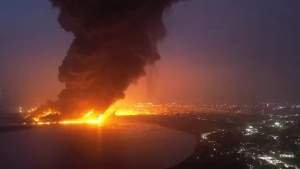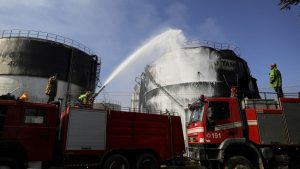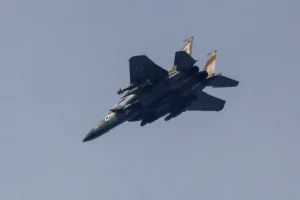New Delhi – A significant escalation in Middle Eastern tensions occurred when Israel Bombs Ports Power Plant Yemen in a comprehensive military operation targeting key Houthi-controlled infrastructure. The Israeli military conducted coordinated strikes against three strategic ports and a crucial power facility, marking the first such attacks on Yemen in nearly a month and triggering immediate retaliatory responses from Houthi forces.
The operation where Israel Bombs Ports Power Plant Yemen targeted the ports of Hodeidah, Ras-Isa, and as-Salif along the Red Sea coast, along with the Ras Kathib power plant. These facilities represent critical infrastructure for the Houthi-controlled regions, making them strategic targets in the ongoing conflict between Israeli forces and the Iranian-backed rebel group.
Strategic Targets and Military Objectives

The comprehensive assault where Israel Bombs Ports Power Plant Yemen also included strikes on a radar system aboard the Galaxy Leader, a vessel seized by the Houthis that remains docked at Hodeidah port. This targeted approach demonstrates Israel’s focus on degrading Houthi operational capabilities while disrupting their ability to coordinate maritime operations in the strategically vital Red Sea corridor.
The Israeli military confirmed that the operation where Israel Bombs Ports Power Plant Yemen came after successfully intercepting a missile fired by the Houthis in the early hours of Sunday. This defensive action preceded the retaliatory strikes, indicating Israel’s pattern of responding to Houthi provocations with disproportionate force against strategic infrastructure.
Immediate Houthi Response and Retaliation
Following the strikes where Israel Bombs Ports Power Plant Yemen, the Houthis launched two missiles toward Israeli territory within hours. Yemen military spokesman Yehyaa Saree claimed responsibility for these retaliatory attacks, specifically targeting Ben Gurion airport, the ports of Ashdod and Eilat, and a power station in Ashkelon as direct retaliation for the Israeli aggression.
Also Read: Breaking: Xi Jinping Skips BRICS Summit 2025 for First Time Ever
The Houthi response to the operation where Israel Bombs Ports Power Plant Yemen demonstrates the escalatory nature of the conflict, with each side responding to attacks with increasingly sophisticated and widespread strikes. The targeting of civilian infrastructure on both sides highlights the dangerous trajectory of this regional conflict.
Casualties and Damage Assessment


Initial reports indicated no immediate casualties from the operation where Israel Bombs Ports Power Plant Yemen, though comprehensive damage assessments were still being conducted. The Israeli emergency service similarly reported no injuries or impact from the subsequent Houthi missile attacks, suggesting that defensive systems on both sides maintained some effectiveness despite the escalation.
The Houthis downplayed the impact of the strikes where Israel Bombs Ports Power Plant Yemen, with spokesman Ameen Hayyan claiming their air defenses forced “a large portion” of Israeli warplanes to retreat. The group reported using locally manufactured surface-to-air missiles to respond, allegedly causing confusion among Israeli pilots and operations rooms.
Regional Context and Gaza Solidarity


The Houthis justify their attacks on Israel as solidarity with Palestinians in Gaza who are under Israeli attack. Since Israel’s war on Gaza began in 2023, the group has fired hundreds of missiles at Israel and launched over 100 attacks on commercial vessels in the vital Red Sea corridor, significantly disrupting international shipping.
The timing of the operation where Israel Bombs Ports Power Plant Yemen comes at a sensitive moment in Middle Eastern geopolitics, with a possible ceasefire in Israel’s war on Gaza hanging in the balance. The escalation complicates regional diplomatic efforts and threatens to expand the conflict beyond the immediate Israel-Palestine theater.
Previous Escalation Patterns
The Houthis had paused their attacks after a ceasefire between Hamas and Israel in January, but resumed them after the United States launched attacks on Yemen on March 15, killing nearly 300 people in subsequent weeks. This pattern demonstrates how regional conflicts interconnect and influence each other across the Middle East.
The operation where Israel Bombs Ports Power Plant Yemen represents a continuation of this escalatory cycle, with each side responding to perceived provocations with increasingly severe military actions. The involvement of multiple regional powers complicates efforts to de-escalate tensions and find diplomatic solutions.
Maritime Security Implications
The strikes where Israel Bombs Ports Power Plant Yemen have significant implications for Red Sea shipping security. The targeted ports serve as crucial infrastructure for both commercial shipping and military operations, making their disruption a matter of international concern for maritime trade routes.
Recent incidents, including a grenade and drone attack on a Red Sea cargo ship that forced its crew to abandon the vessel, demonstrate the ongoing threat to commercial shipping in the region. While no group claimed responsibility for this specific attack, maritime agencies noted it matched the established Houthi target profile.
Broader Regional Conflicts
The operation where Israel Bombs Ports Power Plant Yemen occurred alongside Israeli strikes on Lebanon, targeting several Hezbollah positions in the country’s south and eastern Bekaa region. The Israeli military claimed these strikes targeted infrastructure used for storing and producing strategic weapons and rocket launch sites.
Since a November 27 ceasefire formally ended more than a year of hostilities with Hezbollah, Israel has continued sporadic strikes on Lebanon, claiming the group’s activities violate the agreement. However, Israel typically does not provide evidence to support these claims.
International Implications
The escalation where Israel Bombs Ports Power Plant Yemen adds complexity to regional diplomatic efforts, particularly as Tehran weighs whether to restart negotiations over its nuclear program following United States air strikes that damaged Iran’s most sensitive atomic sites. The interconnected nature of Middle Eastern conflicts means that escalation in one theater often affects diplomatic progress in others.
Conclusion
The military operation where Israel Bombs Ports Power Plant Yemen represents a significant escalation in regional tensions, with immediate retaliatory responses highlighting the dangerous trajectory of Middle Eastern conflicts. The targeting of critical infrastructure by both sides threatens to expand the conflict beyond current boundaries while complicating international efforts to achieve regional stability and peace.

